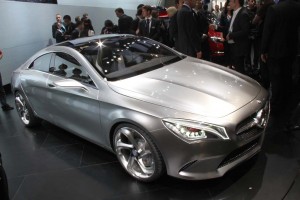
The Mercedes CLA Concept debuting in Beijing last year. The production version could be critical for the maker's revival in the Chinese market.
Mercedes-Benz continues to lose ground in China’s booming premium car market to arch-rivals BMW and Audi — but Daimler AG’s top executive, Dieter Zetsche, told the company’s shareholders meeting the automaker is confident it can make up the ground it has lost in recent months.
Mercedes’ slide has been both acute and unexpected and the maker has struggled even after slashing prices on key models such as the flagship S-Class sedan. That’s particularly worrisome since many analysts expect China will soon become the world’s largest market for luxury vehicles, surging past the U.S.
Zetsche admitted to shareholders that Daimler management is keenly aware it has failed to keep pace with the growth in China. “Our sales had increased rapidly for five years in a row. During that period we posted the strongest average growth of all the premium brands there. Last year, our business expanded only slightly and we lost market share. We have to change this situation and we will.”
The unexpected setback has resulted in some aggressive moves by Daimler, including a shake-up in its Chinese management team. Significantly, the new chief executive for the region has gained a seat on the powerful Daimler Board of Management, something that is not shared by managers from other key markets, including the United States.
“The Chinese market in particular continues to offer enormous potential,” promised Zetsche, who also serves as Mercedes’ global brand boss. “In fact, it is likely that China will account for one out of every three vehicles sold worldwide in 2020. In other words, any company that aims to be a global leader must also have a strong presence in China. It’s a fact that our business there developed positively for many years. It’s also a fact that we didn’t live up to our own expectations there last year,” he added.
Insisting his team understands the reasons behind Mercedes’ slip in China, Zetsche promised to take continuing steps to turn things around, including the “significant” expansion of the maker’s product development center, with the goal of more directly targeting Chinese consumers’ specific needs.
“We are also expanding our Chinese dealership network year by year,” he added.
Zetsche said Mercedes-Benz also is expanding its production in China and plans to add compact models on which Daimler is becoming increasingly dependent to its portfolio of vehicles that are manufactured in China in the future.
“We know what we have to do. Our main aim now is to accelerate the pace. And that’s exactly what we’re doing,” he asserted. “This year alone we will launch seven new or updated Mercedes models in China.”
Later this month, Zetsche plans to unveil a new compact sport utility vehicle at the Shanghai Motor Show. The world premiere will take place next fall at the Frankfurt Motor Show, he added. “Our automotive activities go hand in in hand with the further expansion of our financial services,” he added. “For example, we are the first premium automaker to offers leasing in China.”
Zetsche, however, did not offer any bold predictions about Daimler’s future in China. “Although these developments are dynamic, it’s also clear that none of them alone will be able to change the situation in China overnight. Our strategy is therefore to keep moving in the right direction,” Zetsche said.
Zetsche also was cautious about the unfolding competition with BMW and Audi, which has extended to China from more traditional luxury markets the world.
Overall, Mercedes-Benz sales totals for the first quarter of 2013 were disappointing, Zetsche acknowledged. Total volume for Mercedes-Benz cars increased by just 1%, to 342,000 units. However, BMW sales increased by 5% to 381,404 units and Audi increased its sales by 3% to 369,000 units during the same three-month period.
Zetsche insisted Mercedes-Benz will do better going forward due to the introduction of the new CLA, the revamped E-Class and the redesigned S-Class, which will make its official debut in mid-May, he said.
“We are Daimler. We don’t only want to get better. We want to beat the competition – on a permanent basis.”
